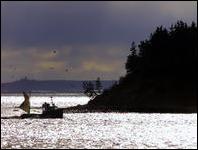| From the The Halifax Chronicle-Herald - Halifax, Nova Scotia
Wednesday, September 28, 2005
McNabs Halifax's little secret
Island is an oasis of calm just minutes away from the downtown bustle
By ALISON AULD / The Canadian Press
Mike Tilley's motor boat cuts through the choppy surf, landing gently on a dark sandy beach that has for years been his near-private playground on McNabs Island. on a dark sandy beach that has for years been his near-private playground on McNabs Island. Since he was a boy in the mid '60s, the straight-talking tour-boat operator has been venturing out to this pristine gem in the middle of the Halifax Harbour to pick apples and berries, hike on deserted trails and explore aging forts long since abandoned by the British Admiralty.
"It's just like my own world three seasons of the year," Tilley, nicknamed Capt. Red Beard for his trademark beard, says as his six-metre boat approaches one of the island's empty beaches, which can see thousands of visitors in the summer months.
"It's incredible to have this resource three minutes away from one-third of the population of the Maritimes."
The 400-hectare island, which sits in the mouth of the harbour, has been a recreation site for boaters, campers, hikers and bikers for decades, but hasn't received the same kind of attention as some of the area's other provincial or federal parks.
Travel to the historic site also drops off dramatically at the end of summer, making it a perfect time to take a bike over for a day of riding on semi-groomed roads and trails.
The main road runs most of the length of the five-kilometre island and streams off to various points of interest starting with Fort McNab, a now crumbling fort built in 1889 that served as an examination battery during the First and Second World Wars.
From the top of the fortifications, the view stretches from open ocean to Hangman's Beach, where the British used to hang deserters and leave their bodies dangling in the steady breeze as a warning to other sailors considering abandoning their station.
At the end of another nearby lane thick with Japanese knotweed and linden trees, a lighthouse anchors a thin spit of rocky beach that was severed when hurricane Juan tore into the island two years ago. The storm also felled dozens of white spruce, beech and birch trees, some of which date back to the 1800s.
Some bird colonies, including ospreys and songbirds, were affected as well, though several blue herons could be seen soaring overhead and ducks bobbed in some of the island's salty marshes.
At the north end of the island, Fort Ives sits atop a flower-covered hill that once served as an anchor point for a First World War submarine net and gives a full view of the cityscape in the distance.
It's this separation from the clatter of urban life that has appealed to many of the people who, like Tilley, voluntarily tend to the island by clearing trails, picking up trash and maintaining its cemetery.
"It's an oasis from the hustle and bustle of the city," says Cathy McCarthy, president of the Friends of McNabs Island Society.
For the lone visitor, it can be initially disarming to be dropped alone on the island with only the sounds of crickets, birds and lapping waves beating in the background. It's possible to spend an entire day without seeing another person, including the caretaker who shares the island with a couple of cottagers.
Beyond the solitude it offers, McCarthy says the island has a rich history extending from its use by the Mi'kmaq 5,000 years ago to its purchase by the McNab family who cleared much of it for farmland and its colourful link to the midway king Bill Lynch, who got his start in the business on the island.
"It's a wonderful outdoor classroom and it's steeped in history," says McCarthy.
Part of that heritage is being threatened as some of the island's historic homes sit in disrepair after years of neglect by the provincial government, something Tilley hopes will change with a new management plan that could see its sensitive historical and natural assets protected.
"What we have to do is keep what's special about the island," says Tilley. "We need to save our beautiful homes that are being allowed to crumble into the ground."
IF YOU GO: Contact Mike Tilley at McNabs Island Ferry in Eastern Passage, N.S., at 902-465-4563. The fare is $10 plus tax per person for a return trip from Fisherman's Cove to McNabs Island. |